The Gulud people, an ethnic group residing in Sudan, have a history that reflects both resilience and adaptation. Originating from the central highlands, the Gulud have inhabited the region for centuries, developing a close connection with their environment. Historically, they have faced challenges such as external conflicts, migration pressures and shifts in regional politics. Despite these challenges, the Gulud have maintained their distinct cultural identity, characterized by their language, customs, and social structures.
The daily life of the Gulud people revolves around agriculture and pastoralism. They cultivate crops like sorghum, millet and maize, which are essential to their diet and economy. In addition to farming, the Gulud raise livestock, including cattle and goats, which serve both economic and social purposes within the community. The livestock are often used in trade, dowry practices, and as a measure of wealth.
Gulud communities are tightly knit, with extended families living close to one another. Their social structure emphasizes communal living, where family and community members work together to farm, build homes and manage resources. The terrain they live on, a mix of highlands and valleys, influences their agricultural practices and has led to the development of unique farming techniques suited to their environment.
The Gulud people practice a blend of traditional animist beliefs and Islam. Their traditional religion involves the worship of ancestral spirits and natural elements, which they believe play a crucial role in their daily lives. Rituals and ceremonies are central to their spiritual practice, often involving offerings and communal gatherings.
With the spread of Islam in Sudan, many Gulud have incorporated Islamic practices into their daily lives. This has created a syncretic belief system where Islamic and traditional elements coexist. Religious leaders, both traditional and Islamic, guide the community in spiritual matters and play a significant role in resolving conflicts and leading communal events.
The Gulud people face several significant challenges, particularly in the areas of healthcare, education and economic development. Access to healthcare is limited, with many community members suffering from preventable diseases due to a lack of medical facilities and clean water. Education is another area of need, as many Gulud children do not have access to schools, limiting their opportunities for the future.
Economically, the Gulud would benefit from support in improving agricultural productivity and market access. Enhancing irrigation systems, introducing modern farming techniques, and providing veterinary care for livestock could significantly improve their livelihoods. Additionally, infrastructure development, such as roads and clean water access, is crucial to improving their overall quality of life and ensuring a sustainable future for the community.
Pray that God will send culturally-sensitive workers who will show them the way to the cross.
Pray for movement to Christ to flourish among this people group in the near future.
Pray for the Gulud people to be blessed with peace, joy and spiritual prosperity as they follow Jesus Christ.
Scripture Prayers for the Gulud in Sudan.
Beswick, S. (2004). Sudan's Blood Memory: The Legacy of War, Ethnicity, and Slavery in South Sudan. University of Rochester Press.
Johnson, D. H. (2011). The Root Causes of Sudan's Civil Wars: Old Wars and New Wars. Indiana University Press.
Lea
| Profile Source: Joshua Project |

























